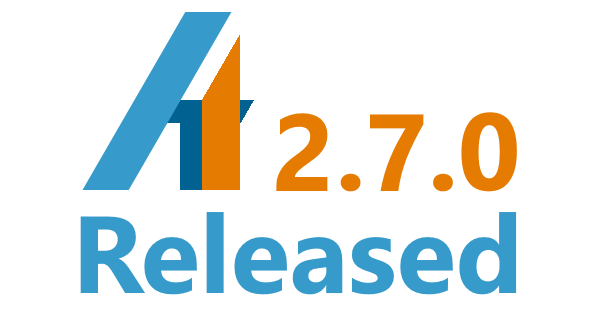Atata 2.7.0 is released with an enhancement of navigation functionality, step feature and other improvements.
Changelog
New Features
- minor
#734 Add
PathAndQueryandRelativeproperties toUriProvider<TOwner> - major
#735 Add support of template variables in
UrlAttributeandGo.Tomethod’surlparameter - major
#737 Support merging of page object’s
NavigationUrlwithGo.Tomethod’surlparameter - minor
#738 Add
FillUriTemplateStringmethods toAtataContext - minor
#741 Add
RelativeUnescaped,AbsoluteandAbsoluteUnescapedproperties toUriProvider<TOwner> - minor
#742 Add
GetComponentsmethod toUriProvider<TOwner> - minor
#745 Add
Reportproperty toAtataContext - major
#746 Add
SetupandStepmethods toReport<TOwner>
Changes and Enhancements
- major #736 Use Selenium.WebDriver package v4.8.0
- major
#739 Optimize
FindByLabelStrategyto use one composite XPath query - minor
#740 Rename
UriProvider<TOwner>.AbsolutePathproperty toPath - minor
#743 Add setter to
TypingIntervalInSecondsproperty ofTypesTextUsingSendKeysCharByCharAttributeandSetsValueUsingCharByCharTypingAttribute - minor
#744 Update methods of
PageObject<TOwner>to use internallyLog.ExecuteSectionmethod instead ofLog.Info
Template Variables in UrlAttribute and Go.To Method’s url Parameter
From now on navigation URLs support template variables.
The URL can be represented in a template format, like "/organization/{OrganizationId}/".
The template is filled with AtataContext.Variables by using AtataContext.FillUriTemplateString(string)
method (see #738).
In order to output a { use {{, and to output a } use }}.
Before navigation ensure that a variable is set in AtataContext.
Set Variable Directly Into AtataContext
AtataContext.Current.Variables["OrganizationId"] = 42;
Set Variable During AtataContext Configuration
AtataContext.Configure().
AddVariable("OrganizationId", 42);
Set Variable in JSON Config
{
"variables": {
"OrganizationId": 42
}
}
Use Template in UrlAttribute
[Url("/organization/{OrganizationId}/")]
public class OrganizationPage : Page<_>
{
}
Go.To<OrganizationPage>();
Use Template Within Go.To
Go.To<OrganizationPage>(url: "/organization/{OrganizationId}/");
Merging of Page Object’s NavigationUrl with Go.To Method’s url Parameter
Before this change, Go.To method’s url parameter always replaced page object’s NavigationUrl value.
Change
Go.To method’s url argument value merges with page object’s NavigationUrl
if it starts with one of: ?, &, ;, #.
For other cases url argument value replaces the NavigationUrl.
Example
[Url("/some/path?a=1")]
public class SomePage : Page<_>
{
}
Go.To<SomePage>(url: "/another/path?b=2"); // -> "/another/path?b=2"
Go.To<SomePage>(url: "?b=2"); // -> "/some/path?b=2"
Go.To<SomePage>(url: "&b=2"); // -> "/some/path?a=1&b=2"
Go.To<SomePage>(url: ";b=2"); // -> "/some/path?a=1;b=2"
Go.To<SomePage>(url: "#fragment"); // -> "/some/path?a=1#fragment"
Added Report Property to AtataContext
Added property to AtataContext similar to the Report property of PageObject<TOwner>:
public Report<AtataContext> Report { get; }
Usage
AtataContext.Current
.Report.Info("...")
.Report.PageSnapshot();
Added Setup and Step Methods to Report<TOwner>
public TOwner Setup(string message, Action<TOwner> action);
public TResult Setup<TResult>(string message, Func<TOwner, TResult> function);
public TOwner Step(string message, Action<TOwner> action);
public TResult Step<TResult>(string message, Func<TOwner, TResult> function);
Setup - executes the specified action and represents it in a log as a setup section with the specified message.
The setup action time is not counted as pure test execution time.
Step - executes the specified action and represents it in a log as a section with the specified message.
Usage
AtataContext.Current.Report.Setup("Set up database for example", x =>
{
// ...
});
Go.To<LoginPage>()
.Report.Step("Fill credentials", x => x
.Email.Set("...")
.Password.Set("..."))
.Report.Step("Login", x => x
.Login.ClickAndGo());
Added Members to UriProvider<TOwner>
/// <summary>
/// Gets the absolute path and query provider of the URI.
/// For example: <c>"https://example.org/some/path?arg=val#frg"</c> -> <c>"/some/path?arg=val"</c>.
/// </summary>
public ValueProvider<string, TOwner> PathAndQuery { get; }
/// <summary>
/// Gets the relative URI provider of the URI.
/// For example: <c>"https://example.org/some/path?arg=val#frg"</c> -> <c>"/some/path?arg=val#frg"</c>.
/// </summary>
public ValueProvider<string, TOwner> Relative { get; }
/// <summary>
/// Gets the unescaped relative URI provider of the URI.
/// For example: <c>"https://example.org/some/path?arg=%3F"</c> -> <c>"/some/path?arg=?"</c>.
/// </summary>
public ValueProvider<string, TOwner> RelativeUnescaped { get; }
/// <summary>
/// Gets the absolute URI provider of the URI.
/// For example: <c>"https://example.org/some/path?arg=val#frg"</c> -> <c>"https://example.org/some/path?arg=val#frg"</c>.
/// </summary>
public ValueProvider<string, TOwner> Absolute { get; }
/// <summary>
/// Gets the unescaped absolute URI provider of the URI.
/// For example: <c>"https://example.org/some/path?arg=%3F"</c> -> <c>"https://example.org/some/path?arg=?"</c>.
/// </summary>
public ValueProvider<string, TOwner> AbsoluteUnescaped { get; }
/// <summary>
/// Gets the specified components of the URI using the specified escaping format for special characters.
/// </summary>
/// <param name="components">The components.</param>
/// <param name="format">The format.</param>
/// <returns>A <see cref="ValueProvider{TValue, TOwner}"/> of the components string.</returns>
public ValueProvider<string, TOwner> GetComponents(UriComponents components, UriFormat format = UriFormat.UriEscaped);
